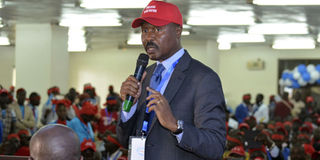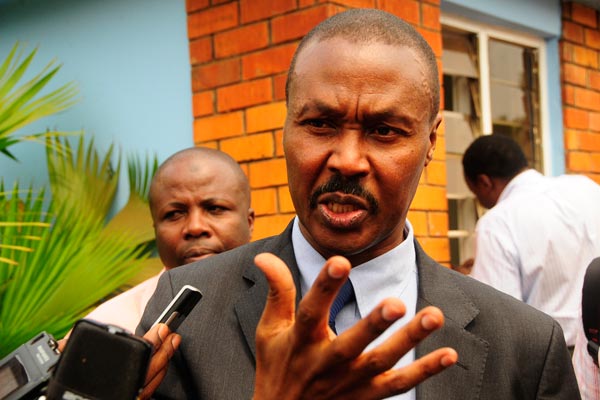Is Muntu’s gamble self-destruction or salvation?

Deserter. Former FDC party president Mugisha Muntu addresses the party delegates conference in Kampala last year. PHOTO BY ABUBAKER LUBOWA.
What you need to know:
- In leaving FDC, the former party president is buoyant to act on his terms.
- If he flounders, he would have handed an ammunition to his critics and written the epitaph on his political tombstone.
Kampala. Things have fallen asunder; at least that is the writing on the wall for Uganda’s biggest Opposition political party, the Forum for Democratic Change (FDC).
News yesterday that some of its founding and notable members were breaking ranks played out more than a media fodder to underline an eruption unmasking years of troubled political marriage, intrigue and unity.
The monster of pre and post-independence parties’ implosion over irreconcilable differences had by last evening knocked the FDC ship hard, cracking it to free fed-up members, who have promised a major announcement tomorrow.
There was speculation the proclamation would likely be about the birth of a new political party, or ‘third force’, adding to a motley others, including paper tigers, all jostling to dislodge President Museveni.
What next for FDC?
FDC may be a juggernaut in Opposition, but it is not of the political tribe of the ruling National Resistance Movement (NRM) that can lose an Eriya Kategaya, then a defacto Number Two, and dangle a juicy job to buy his return and loyalty.
FDC’s currency is hope. The question then is: what next for it after yesterday’s developments?
Ms Salaamu Musumba, the party’s vice president for Eastern Region, said the departure of Gen Muntu, a former commander of the Uganda People’s Defence Forces, was long in coming and epitomised his betrayal of the energy he invested in building the party.
“It is him (Muntu) who can’t stand Patrick Oboi Amuriat as his (party) president and we don’t know why. We shall count our losses and start from wherever,” she said.
READ:
In a way, Ms Musumba is arguing that FDC’S November 24, 2017 presidential vote that Maj Gen Muntu lost to Mr Amuriat, caused an irreparable damage among some officials.
According to Mr Yona Kanyomozi, a former minister during Obote II government-turned an FDC founder member, the secession is “unfortunate”.
He said: “FDC will disintegrate further because there are people who will be fence sitters, while others will try to find their way around and the cohesion of the old party (FDC) as we know it will be dealt a blow. It is sad.”
Vilified by some FDC members, including senior officials, as a “mole”, Gen Muntu in a way lived in a house where he was not trusted and one he did not trust.
There had also been an inherent polarity between his non-confrontational approach of build structures in villages first and critics’ preference for defiance.
Left long time ago?
Mr Moses Byamugisha, who stood against Maj Gen Muntu and Mr Amuriat in the last FDC elections, said the party is bigger than its bickering leaders and the internal schism will be inconsequential.
In the hearts of many FDC members, he said, Gen Muntu left a “long time ago.”
Looked at through this prism, the ex-army commander’s breakaway was a validation of long-standing suspicion rather than a political thunderbolt.
The splinter group is keeping its political card close to the chest, leading to speculation.
The analysis based on guesswork carries with it the risk of a false start.
To the Opposition, another self-destruct button has been pressed. Gen Muntu’s team has higher chances of poaching from the Opposition estate than NRM fold.
In the end, President Museveni will be the winner when his opponents, often out-spent at election and brutalised on the streets, cannibalise one another like bottled grasshoppers.
They thus free the hands of the incumbent to infiltrate, dominate and politically destroy them from within, including through innocuous methods.
This turn of events echo the siren of the President’s declaration that there would be no Opposition in Uganda by the next general elections expected in 2021.
The Amama Mbabazi case
With infighting weighing down opponents, upstaging Mr Museveni from within through the electoral process gets even harder, if not politically suicidal. And there is a precedent.
When then Prime Minister Amama Mbabazi broke ranks with NRM, where he was the party secretary general, and ranged his chest against President Museveni for the coveted State House seat, there was euphoria that his organisational skills and long experience in Intelligence and government would give Mr Museveni a run for his money in the 2016 elections. It didn’t.
Mr Mbabazi by the last ballot count had obtained less votes nationally than Lord Mayor Erias Lukwago polled to win City Hall.
Some analysts, therefore, argue that Gen Muntu must have felt suffocated within FDC and saw no hope of pursuing his own ambition to lead Uganda.
In leaving, he is buoyant to act on his terms.
If he flounders, Gen Muntu would have handed an ammunition to his critics and written the epitaph on his political tombstone.





